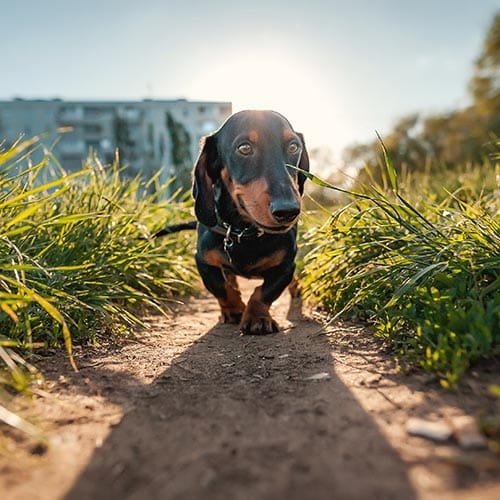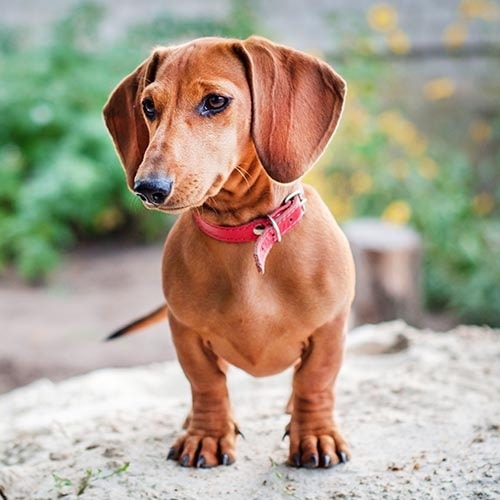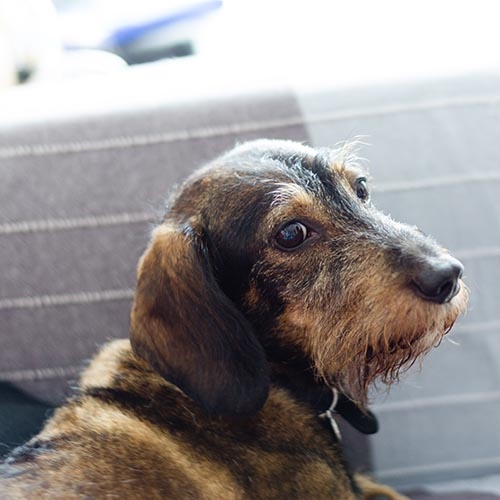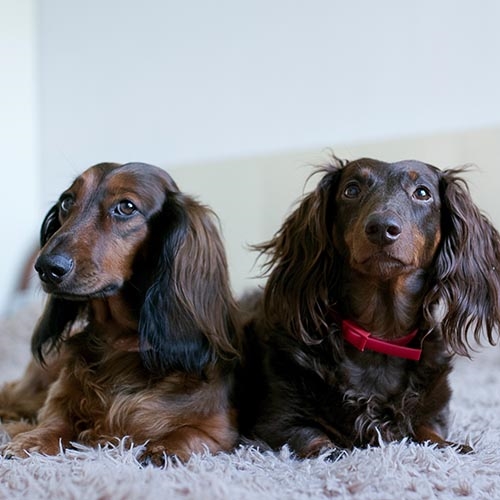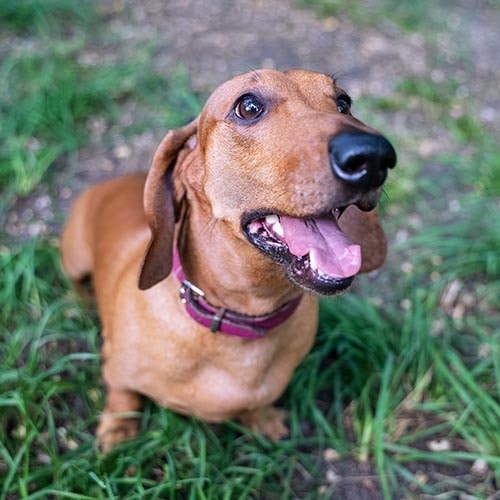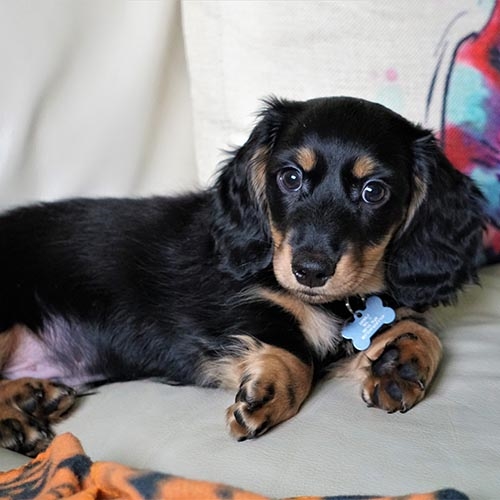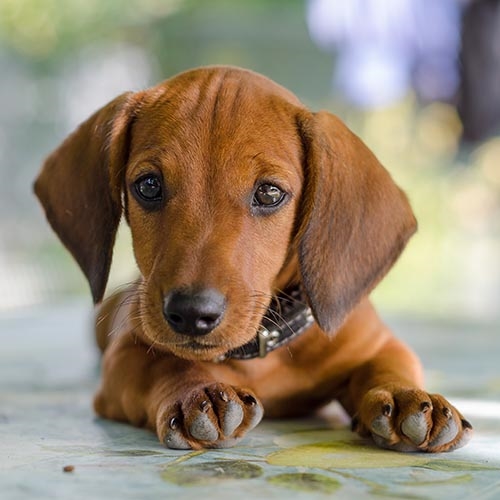| Size | Medium |
|---|---|
| Average height | Standard 20-27cm, Miniature 13-18cm |
| Average weight | Standard 9-12kg, Miniature 4.5-5kg |
| Average lifespan | Over 12 years |
| Minimum exercise (per day) | Standard 1 hour, Miniature 30 minutes |
| Coat length | Short |
| Minimum cost (per month) | £65 |
Dachshunds are affectionate and playful little dogs who have a lot of energy considering their smaller size. Once they’ve tired themselves out getting into mischief, they’re happy to curl up somewhere warm with their owner.
Dachshunds can have either short or long fur. There are six varieties available; smooth, long or wire haired which can be either standard or miniature sized. They’re clever dogs who can be wilful at times so suit experienced owners with the time and patience to train them.
Common health problems in Dachshunds
Dachshunds are active dogs who enjoy being involved in everything around the home. Sadly, due to the way they have been bred, they are prone to certain conditions.
If you are thinking of buying a Dachshund puppy, make sure the parents of your puppy have had the relevant health screening to reduce the chances of your puppy being affected by certain conditions. We’d recommend looking for a Kennel Club Assured Breeder as they meet extra requirements which will benefit your puppy’s health.
Some of the conditions Dachshunds may develop include:
- Intervertebral disc disease – abnormality of the discs that provide cushioning between the vertebrae (back bones). Both standard and miniature varieties are affected by back problems.
- Heart disease (miniature varieties).
- Progressive Retinal Atrophy – gradual loss of sight over several months or years. DNA testing of all miniature varieties prior to mating is recommended.
- Dry eye.
If you want to minimise the risk of your dog getting problems, you can read our advice on choosing a pedigree dog.
Caring for your Dachshund
Dachshunds are loyal and loving dogs but definitely have an independent side to them when it comes to training! They do well with experienced owners who are used to (and prepared for!) their little quirks.
They are very entertaining dogs due to their playful nature, so there’s certainly never a dull moment with a Dachshund around! They don’t do well on their own and prefer to have someone around all day who they can play with.
Dachshunds and barking
Your Dachshund is likely to make noise in some form or another and this will be down to their training and personality. Because they are so clever, it is possible to train a Dachshund not to bark a lot for no reason but this needs to start at an early age. They have a surprisingly deep bark and will definitely use it to let you know if they’re unhappy about something. If you’re having problems with excessive noise, we recommend seeking the advice of an accredited behaviourist.
Training and socialisation
Dachshunds need positive, reward-based training from an early age as they can be wilful when it comes to training. You’ll need to set clear boundaries and be consistent with your Dachshund and prepare to be very, very patient with them. As they have a strong prey drive Dachshunds have been known to lose interest in their training sessions if they smell something more interesting. For this reason, they suit experienced owners who are aware of their needs. If you need a bit of extra guidance with training, we’d recommend taking them to accredited training classes.
Dachshunds love attention so by socialising your Dachshund from a young age with lots of people, dogs and experiences they will grow into happy and fun-loving adults.
Dachshunds love human company so can develop separation anxiety if left alone. They do best in homes where someone is around all day to keep them company and play with them.
Exercise
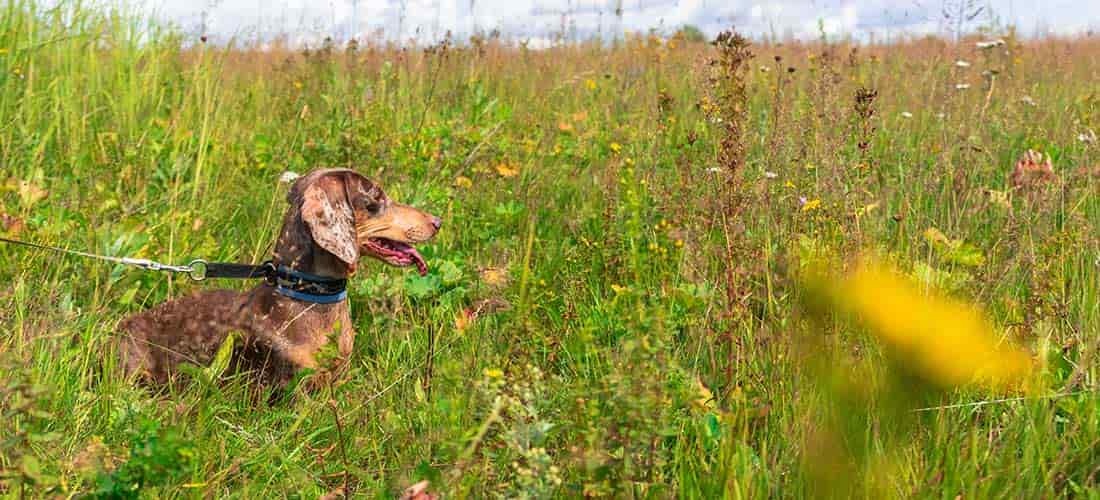
Dachshunds are surprisingly high energy, so giving them plenty of exercise is an absolute must to keep them happy and healthy.
Your Dachshund will need a minimum of an hour exercise every day (half an hour if you have a miniature variety). This should be split into a couple of walks, one slightly longer to allow lots of time for sniffing. They will also need plenty of time to run and play off-lead in a secure area. However, you should be careful with the type of exercise they do – Dachshunds shouldn’t jump as they can easily damage their backs.
On top of this, you should also have daily training sessions and give your Dachshund lots to keep their brain active to stop them getting bored. They’ll enjoy scent and puzzle games especially!
Remember to take exercise easy while your Dachshund is still growing. Due to their shorter legs and longer backs, it’s easy for them to overdo it and hurt themselves while their bones are still developing.
Grooming
Depending on the type of Dachshund you get, they can either be high or low maintenance when it comes to grooming.
For Dachshunds with short fur, a weekly brush should be more than enough to keep their coat in good condition. That said, they’ll love having your attention all to themselves so you may find they come to you for a groom more often than they need it!
If you have a long coated Dachshund, they will need a brush a few times a week to make sure it doesn’t get matted. This is especially important after long walks in case there is anything stuck in their fur.
Wirehaired Dachshunds will need a weekly brush but may need professional grooming a few times a year to keep the coat neat and trim.
No matter which Dachshund you get, they will shed throughout the year. Give your home and their bed a regular hoover and it should be manageable.
Dachshunds and children
Dachshunds love people and attention so generally get along well with children of all ages. Remember to make sure you can recognise your dog’s body language so you can put a stop to any potentially stressful situations before they escalate. Always supervise your dog with children and vulnerable adults.
Dachshunds and other pets
Generally speaking, as long as your Dachshund has been socialised well from a young age, they should get along fine with other dogs.
Dachshunds do have a high prey drive and love to chase so we wouldn’t recommend keeping them with smaller pets. They may get along OK with a cat they have grown up with, but you should always supervise your Dachshund with other animals.
Food
Your Dachshund’s diet will vary depending on their age. You’ll need to feed them a complete, balanced dog food to keep them slim and healthy.
Your vet or vet nurse will be able to tell you how much your Dachshund should be eating. You should feed them a good quality, commercially available, complete dog food. We usually recommend splitting their daily allowance into two meals. If you give your dog the occasional treat or use treats for training, remember to take this into account and reduce their daily allowance. Treats shouldn’t make up more than 10% of their daily calorie intake as this can unbalance their diet.
Try to feed your dog at similar times every day as they like routine. Remember to leave a gap between eating and exercising.
The cost of owning a Dachshund
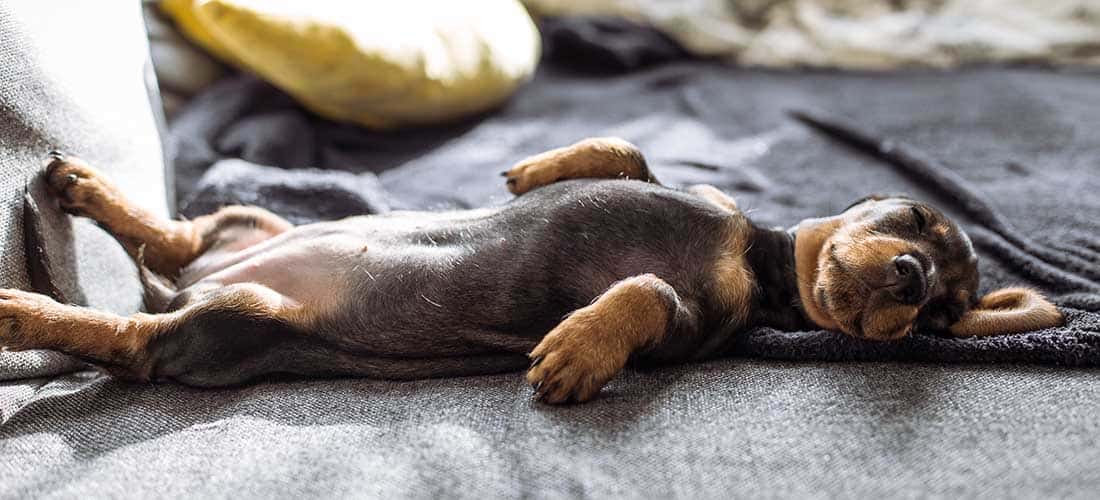
You can expect your Dachshund to cost you a minimum of £65 per month after purchase and set-up costs and over £11,000 across their lifetime.
Costs you’ll need to think about include:
Purchase costs
Adopting an adult Dachshund from a rescue centre may be a more cost-effective option, with the added advantage of giving a home to a pet without one – check if the rehoming centre you’re looking at asks for a donation for rehoming.
If instead you’re buying a Dachshund puppy from a breeder, you’ll need to factor in this cost. Beware unusually cheap puppies as they could come from a puppy farm. If you’d like to buy a pedigree puppy, we recommend looking for a Kennel Club Assured breeder. These breeders must do extra health tests and meet higher standards.
Set up costs
- Puppy vaccines – if you rescue a dog, reputable centres will often vaccinate them for you. Remember that ongoing booster vaccinations will be needed to continue their immunity.
- Neutering – you should usually arrange for your dog to be neutered at around six months old, although your vet will be able to advise you exactly when is best. Check prices at your local practice as these will depend on your vet and where you live. Some rescue centres will neuter any dogs they rehome, saving you this cost.
- Equipment – including a collar and tags, lead, harness, dog beds, dog bowls, pet-safe toothpaste and toothbrushes, grooming brushes and toys. Keep in mind that all these will need to be replaced with wear or damage or if your dog outgrows or damages them!
Ongoing costs
- Food.
- Preventive healthcare – budget for routine vet visits to help stop your dog getting ill and catch any problems early. They need annual check-ups, vaccinations and regular flea and worming treatments. Check if your vet offers a health care plan as this can help spread the cost throughout the year.
- Vet bills* or pet insurance – if you don’t have pet insurance and your dog needs veterinary treatment for an injury or illness, costs can rapidly mount up. Check what’s covered and what isn’t when comparing policies.
- Accessories – including lots of poo bags, replacing worn toys and grooming accessories, buying doggy toothpaste and any other extras they might need.
Other costs
- Training – basic training is very important and dogs can benefit from formal classes. Some dogs may have, or develop, behavioural problems which might need professional management.
- Boarding – you may also need to budget for boarding or dog sitting costs if you are planning to go away from home on holiday.
- Dog walkers/day-care – you might consider a professional dog walker to keep your dog happy and healthy if you’re unable to get out with your dog enough yourself, or to look after them during the day if you need to be out for more than four hours.
* It’s always better to plan ahead and budget or get pet insurance in case your pet gets injured or unwell. If you are having difficulty with veterinary costs, you can check if you are eligible for treatment at PDSA here.
If you’re considering pet insurance, our PDSA Pet Insurance could be a great option for you and it’s quick and easy to get a quote online.
Fun facts
- Dachshunds can be two different sizes and have three different coat types.
- They can live longer than most breeds and two Dachshunds have held the Guinness World Record for oldest living dog.
- The first Olympic mascot was a Dachshund called Waldi.
- Dachshunds love to curl up in warm places, which often means making a little nest for themselves anywhere they can burrow down.
Getting a Dachshund
Do plenty of research before getting a Dachshund. These loving little dogs are full of beans and will often tire out way after their owner! They can be wilful at times so need an owner prepared to work through this. In return you’ll get a happy little companion.
Rehoming centres
There are plenty of rescue centres across the country where you may find a Dachshund. Breed-specific rescues that specialise in Dachshunds are also out there. You’ll need to ask any rescue centre about the dog’s history to make sure they will be comfortable in your home. Good rescue centres should let you know of any health and behaviour problems.
Breeders
If you buy from a breeder, make sure your puppy will be well socialised and have all necessary screening tests, health checks and vaccinations. It’s really important that Dachshund puppies from a breeder get the right early socialisation so always ask the breeder about how they go about this. We recommend looking for a Kennel Club Assured breeder as they meet higher standards. We’ve put together some advice to help you find a good breeder.

